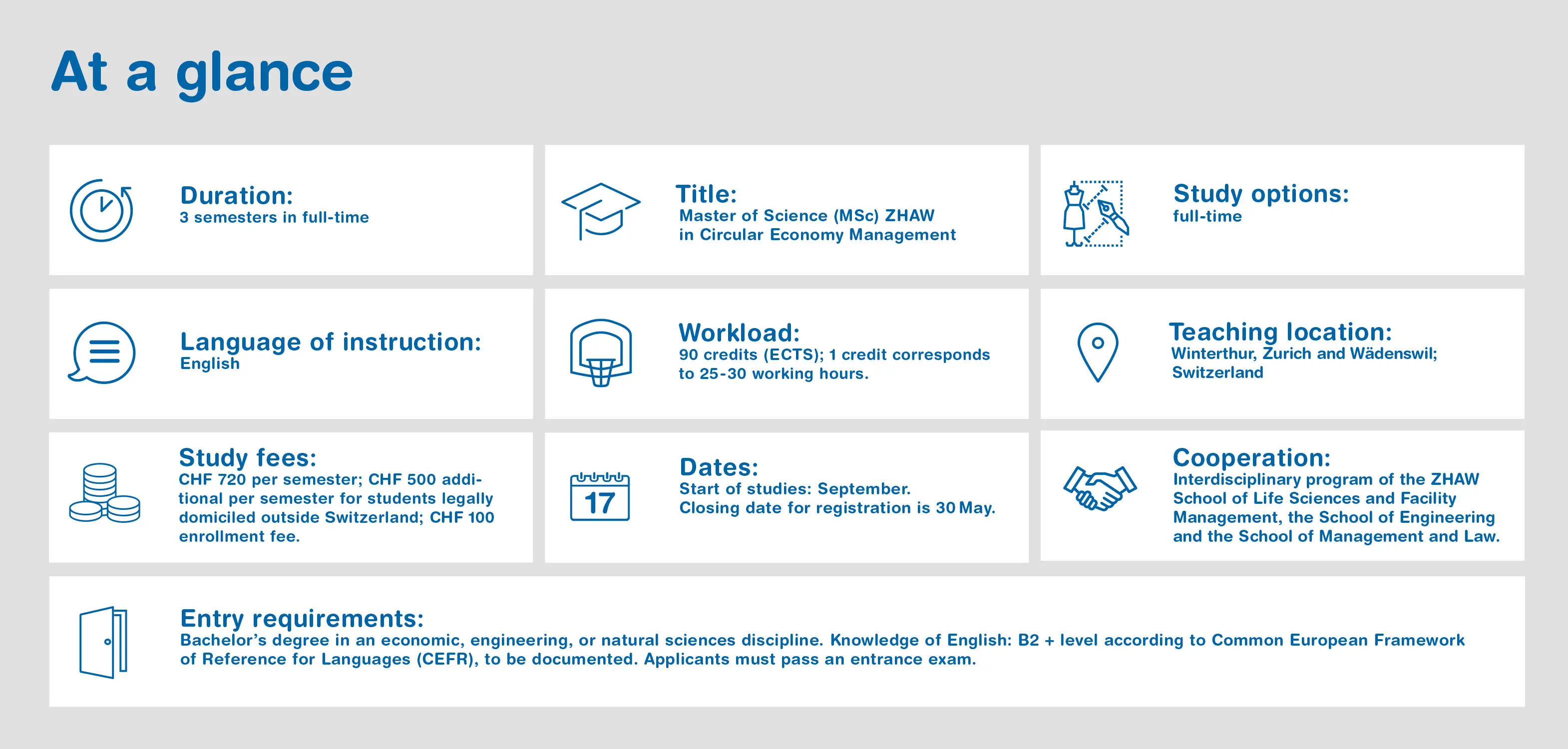Master of Science in Circular Economy Management
A master's programme providing a unique, interdisciplinary, and practice-oriented approach, that allows students to focus entirely on their professional goals and interests.
Why pursue a Master’s degree in Circular Economy Management?
The MSc in Circular Economy Management is a new degree program that supports our university's key commitment to sustainability, specifically to impart and develop knowledge and skills in that area and support individuals and organizations in their efforts to make a valuable contribution to society.
This Master’s program has been designed and developed jointly by three schools of the Zurich University of Applied Sciences (ZHAW) – Life Sciences and Facility Management, Engineering, and Management and Law. It is a truly interdisciplinary program that utilizes and combines expertise from several different disciplines.

«In this Master you will acquire competences to take the circular economy a decisive step into the future.»
Your career after graduating from the Master's in Circular Economy Management
This Master’s program will allow you to become highly qualified and enable you to focus on topics that meet your personal and professional goals.. You can benefit from an immediate, practically orientated knowledge transfer. Graduates choose from a range of potential employers and careers. Ideal entry-level positions can be found in the private sector, public administration and non-profit organisations.
Job roles: Consultant (in-company or external), Corporate Social Responsibility Manager / Coordinator, Product Manager (design, development, innovation), Production and Operations Manager, Project Manager, Supply chain management (incl. distribution and logistics), Self-employed (entrepreneur, founding start-up), Management role (Engineering / Technology / Circular Economy), Communications Manager, Quality Manager
Sectors: Industry and manufacturing, Service sector, Consultancy, Public sector, Not-for-Profit Organisation

«The skills needed to manage projects, spot new business opportunities, and apply critical thinking are all very important. Graduates must be both curious and creative, and they also need to have empathy for others. This is a highly networked function that has an impact on a company's entire organization.»
Andreas Mueller, CEO,
Georg Fischer AG
Good reasons to study for a MSc in Circular Economy Management an der ZHAW
- Unique programme: The program’s inter- and transdisciplinary approach is unique. The curriculum has been co-designed by a team of experts from across ZHAW, combining the disciplines of engineering and technology, natural and environmental sciences, business studies, and social sciences.
- Module content: the module content, supported by practical case studies and actionlearning segments, highlights the interconnectedness of the disciplines that contribute to the circular economy. In addition, state-of-the-art knowledge, some of it from the lecturers’ own research projects, enrich the curriculum
- Methodical approach: the scientific foundations of the program are addressed in all participating disciplines. The program enables students to know, apply, critically reflect on, and further develop proven and new approaches, concepts, and instruments for a future-oriented circular economy management.
- Individualisation: by choosing electives designed for specific professional roles and careers, students can follow their preferred learning path.
Study programme and course content
The MSc in Circular Economy Management is a full-time course of study. It consists of a preliminary week and three semesters of intensive study.
The program combines all dimensions of the circular economy – technical, environmental, social, and economic - and students acquire practical and theoretical knowledge in all disciplines. Students develop a broader understanding and implementation skills for the circular economy through an interdisciplinary, hands-on approach.
The program’s compulsory modules are grouped into themes and provide a foundation, while elective clusters allow students to prepare for specific career paths and professional roles. Case studies and, ultimately, the Master’s thesis provide students with practical credentials. In addition, there is a strong emphasis on developing critical thinking, creativity, communication, teamwork, self-management, and self-reflection
Your new competences: You ...
- have a solid knowledge of decision-making tools, current and future manufacturing technologies, digital transformation, value chain, and regulatory issues relevant to circular economy;
- have acquired specialized knowledge, skills, and competencies related to the circular economy;
- be able to use their research skills to produce qualified results to solve complex problems;
- be able to apply, analyze, and synthesize theory and practically relevant subject content;
- be able to design and plan creative and innovative circular economy strategies and action plans and contribute to their implementation;
- be prepared for positions in the field of sustainability and the circular economy and be able to lead demographically and professionally diverse teams.
This might also interest you
CV-Check
Are you interested in a Master's degree program and would like to know whether you meet the requirements?
Registration Master's programme
CV-Check
Organise your studies
Ready for a new chapter in your life? Apply now.
Are you interested in a Master's degree program and would like to know whether you meet the requirements?
Fees, important dates, timetables and the Study App at a glance.


